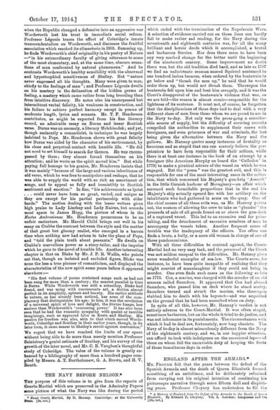1.111, NAVY BEFORE NELSON.*
Tam purpose of this volume is to give from the reports of Courts-Martial which are preserved in the Admiralty Papers some picture of what the Navy was like during the period • Naval Courts Martial. By D. Hannay. Cambridge ; at the University Press. [Els. net.] which ended with the termination of the Napoleonic Wars. A selection of evidence carried out on these lines can hardly fail to make rather sad reading, for the Navy during the seventeenth and eighteenth centuries was, for all the many brilliant and heroic deeds which it accomplished, a brutal and barbarous Service. Nor does there seem to have been any very marked change for the better until the beginning of the nineteenth century. Some improvement no doubt there was, but the old tradition died bard, and as late as 1797 we find an unfortunate seaman named Squirrel sentenced to one hundred lashes because, when ordered by the boatswain to go below and "thrash the men up," he said that he would order them up, but would not thrash them. Thereupon the boatswain fell upon him and beat him savagely, and it was the Court's disapproval of the boatswain's violence that was, so we are told—the reason is almost comic—responsible for the lightness of its sentence. It must not, of course, be forgotten that the disciplinarians of those days had to deal with a very different class of men from those whom we are proud to see in the Navy to-day. Not only was the press-gang a consider- able source of supply, but the difficulty of securing recruits compelled the authorities to supplement their crews with foreigners, and even prisoners of war and criminals, the last being given the alternative between the Navy and the gallows. Mr. Hannay quotes many instances of brutality so ferocious and so stupid that one can scarcely believe the per- petrators to have been responsible for their actions, while there is at least one instance in the book of an attempt by a foreigner (the American Murphy on board the ' Culloden ' in 1779) to make a piratical seizure of the vessel on which he was engaged. But the " press " was the greatest evil, and this is responsible for one of the most interesting oases in the collec- tion, that which concerned his Majesty's gun-brig Assault' in the little Cornish harbour of Mevagissey—an affair which assumed such formidable proportions that in the end his Majesty's ship actually opened fire with her artillery on the inhabitants who had gathered in arms on the quay. One of the chief causes of all these evils was, as Mr. Hannay points out, the custom of allowing the crew to take as " plunder " the proceeds of sale of all goods found on or above the gun-deck of a captured vessel. This led to an excessive zeal for prize- taking, and the detachment of excessive numbers of men to accompany the vessels taken. Another frequent cause of trouble was the inadequacy of the officers. Too often one finds a brute, a bully, or a mere old woman in charge of one of these pandemoniums.
With all these difficulties to contend against, the Court- Martial had no very easy task, and the personnel of the Court was not seldom unequal to the difficulties. Mr. Hannay gives some wonderful examples of sea-law. The Courts seem, for instance, to have been quite incapable of realizing that they might convict of manslaughter if they could not bring in murder. One even finds such cases as the following so late as 1776. Cox, a marine, was charged with the murder of an old seaman called Saunders. It appeared that Cox had abused Saunders, who passed him on deck where he stood sentry. Saunders turned and struck the marine, who thereupon stabbed him to death with his bayonet—and was acquitted on the ground that he had been assaulted when on duty.
In spite of all this, however, Mr. Hannay's verdict is not entirely adverse to the Court-Martial. It was often stupid, sometimes barbarous, but on the whole it tried to do justice, and was not inhumane in its punishments. The circumstances with which it had to deal are, fortunately, now long obsolete. The Navy of to-day is almost miraculously different from the Navy of the eighteenth century, and we, in our happier situation, can afford to look with indulgence on the occasional lapses of those on whom fell the unenviable duty of keeping the fleets of those tumultuous days in order.


































 Previous page
Previous page